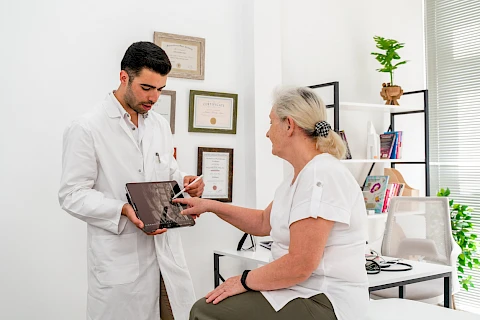
Osteoporosis is a condition that primarily affects seniors, causing bones to become weak and brittle. It leads to fractures and significant lifestyle changes for many. Awareness and proactive management can greatly impact quality of life, allowing for independence and reducing the risk of injuries. Seniors and caregivers need to know more about managing osteoporosis effectively and maintaining a healthy, active lifestyle, as Senior Helpers Charlotte will unveil.
What Is Osteoporosis?
Osteoporosis is a disease that weakens bones, making them fragile and more likely to break. It occurs when the creation of new bone doesn't keep up with the loss of old bone. This imbalance can lead to brittle bones; even minor stresses like bending over or coughing can cause fractures. These fractures commonly occur in the hip, wrist, or spine. Watch for signs such as back pain, decreased height over time, and a stooped posture.
Risk Factors for Osteoporosis
Several factors can increase the likelihood of developing osteoporosis. Age is a significant risk; as individuals grow older, bone density naturally decreases. Genetics also plays a role, so if your family has a history of osteoporosis, your risk may be higher.
Lifestyle choices, such as smoking and excessive alcohol consumption, can weaken bone structure. Additionally, certain medical conditions, like rheumatoid arthritis and medications such as long-term use of steroids, can contribute to bone loss.
Bone Density Tests
Bone density tests are crucial for diagnosing osteoporosis and assessing fracture risk. Using a special X-ray, these tests measure the amount of minerals, like calcium, in your bones. It's usually recommended for women over 65 and men over 70, but those with risk factors should consider testing earlier.
Early detection through bone density tests can lead to effective management and treatment, preventing severe consequences. Speak with a healthcare provider about the appropriate time for testing to ensure that you or your loved ones stay informed about bone health.
Lifestyle Choices for Bone Health
Adopting a healthy lifestyle helps maintain strong bones. Nutrition is key; a diet rich in calcium and vitamin D supports bone density. Dairy products, green leafy vegetables, and fortified foods can help meet nutritional needs. Regular physical activity is another cornerstone of bone health.
Engaging in weight-bearing exercises such as walking, jogging, or lifting weights strengthens bones. Additionally, avoiding smoking and limiting alcohol intake can significantly decrease the risk of osteoporosis. These lifestyle choices benefit bone health and overall well-being. Seniors should always consult a doctor before starting a new fitness routine.
Managing Osteoporosis
Managing osteoporosis involves a combination of treatments and lifestyle modifications. Various medications and supplements can be prescribed to slow bone loss and build bone strength.
Physical therapy and regular exercise for those with osteoporosis can greatly improve mobility and bone density. Moreover, preventing falls is critical. Implementing safety measures at home, such as removing tripping hazards and ensuring adequate lighting, can reduce the risk of fractures. With proper management, individuals can lead active, fulfilling lives despite having osteoporosis.
Contact Senior Helpers for Comprehensive Care Services
Osteoporosis is a significant concern for seniors, but it can be managed effectively. From learning the risk factors to embracing healthy lifestyle changes, everyone can take steps toward maintaining strong bones. Senior Helpers Charlotte is here to help if you or your loved one needs support. We offer personalized senior care options in Charlotte, Pineville, and Concord. Contact us today to learn more.